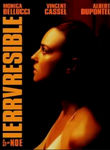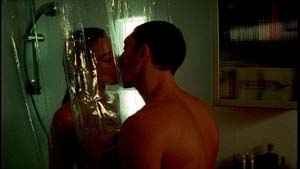The Clash: Westway to the World (1977-1986)
2000, Directed by Don Letts
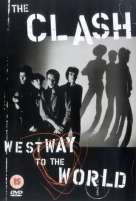
This is another in our Julien Temple retrospective although it is directed by Don Letts, it is clearly influenced by Temple's first movie. Temple's second movie about the Sex Pistols came out around the same time.
I suppose the thing that keeps rock documentarians up at night screaming into their pillows is the Spinal Tap movie. After one sees this -- and nearly everyone who is going to go see a rock documentary HAS seen This Is Spinal Tap -- how can one not draw comparisons to every other rock doc? Letts avoids those Spinal Tap moments by just letting the members of the band speak, one on one, directly to the camera and then edits their commentary through a complete history of the band, from their humble origins, through their Sex Pistols & Ramones epiphanies, to the height of their artistic career (London Calling) and then through the excesses and finally their explosive break-up. Joe Strummer and Paul Simonon who have the most to say dominate most of the commentary. Even when they describe their biggest excesses - the "Stalinist" cult-like nature of the early band, the Sandinista LPs and Strummer's obvious hurt from this critical disaster, they never come off as seeming silly.
Letts also allows each of the members to paint portraits of themselves and you leave with a better understanding of the often volatile personalities behind the band. Strummer comes off as the thoughtful leader of the group. He mainly found himself trying to keep the peace between the arrogant but talented Mick Jones and the wild Paul Simonon while keeping an eye on their junkie drummer, Topper Headon, who would be the most tragic member of the band if Strummer hadn't died last year. I could watch Strummer talk all day in this film - visually, it's hard to take your eyes off him. But it's clear that each member needed the other. Mick was the ego, Paul the id and Strummer the parental ego.
Here's what Letts has said about the technique of letting the musicians speak for themselves (source below) although its surprising that he says Strummer was disinterested!:
Well, I knew their party line, I knew what lines I could and couldn't cross, and I knew how far I could push them as well. I thought about having a voiceover because most band members can't string a couple of sentences anyway. These guys didn't have that problem. I'm really pleased that they managed to tell their story themselves. That was what was interesting about doing this project, I realized they were all still The Clash. Mick was into every single damn detail, Topper wanted to get some money, Joe was disinterested, and Paul wanted to look good.In terms of flow, Letts mainly works chronologically although some stories appear out of sequence. Letts quickly sets the scene and suggests that The Clash's roots were in the dark side of '68 protest rock, the Rolling Stones "Street Fighting Man" and reggae. Strummer's first group The 101ers was a garage band and he describes how inadequate he felt after seeing the Pistols. He meets Jones and Simonon at the dole line and thinks they are going to beat him up. Letts shows what looks like footage from their first rehearsal and first gigs. Their political roots, some might say, are shallow but Letts shows their participation in the black riots in London ("White Riot" was written about that), protest reggae and the members admit that early on Strummer was basically running a "Stalinist" cult kicking out one of their drummers because he was too materialist. You'll have to make your own mind up whether their politics were mere posing what with their major label backing and such or truly heartfelt. I think the music speaks for itself. We then see them graduate to stadium shows - their clothes get flashier and their body language gets more hostile towards each other. And then finally, their odd breakup (during the photo shoot for Combat Rock) is recounted by the photographer.
And then there are the stories -- the arrest for killing pigeons. The Clash beating up a producer who got on their nerves. The ground-breaking London Calling sessions with Guy Stevens and how they came up with the classic cover photograph. Mick and Joe going to Jamaica to bond and leaving Paul behind (he's still bitter).
The only real Spinal Tap moments come when Letts allows others to speak for The Clash and thankfully this is very little. A rock critic comes on and intones about "tower blocks and urban alienation and disaffected youth and all that..." Terry Chimes, their first drummer who "didn't particularly like them" and his desire for a fast car getting him kicked out of the band are, perhaps, unintentionally funny. The sound engineer
Letts has clearly seen Temple's first Sex Pistols film. He uses similar pacing but avoids the worst aspects of that film by letting the band speak for themselves. Temple's second Sex Pistols film (The Filth and Fury) does the same. An interesting note, Letts was the original DJ at the Roxy, arguably the first London punk rock club. He directed all The Clash albums. He also appears in "I Love the '80s" on VH-1!
The DVD extras are nice but its disappointing that they couldn't release a second disk with all the original concert footage and videos. There is a truckload of extra interview footage (more Strummer, yay!) so I guess that makes up for it. Note - he talks about the band Suicide and how he thought Alex Vega was "the bravest man" he ever saw perform since the band was so hated in England. Poignant to watch considering his early death.
Research links:
Here's an interview with Letts in which he references Temple:
GI: So where did filmmaking come into the picture?
DL: People were picking up guitars and the stage got kind of filled up. I wanted to pick up something so I picked up a Super 8 camera. There was myself and a guy called Julien Temple. Punk rock encouraged people to get involved themselves, the whole DIY ethic that still works for me on a day-to-day basis.
Meta-Note: I've redesigned my template a little. Thanks to Loki's template for providing the source for my "currently watching" on the sidebar.

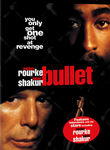
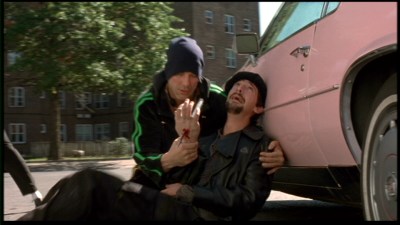 Rourke's film is very much an actor's film, utilizing a talented ensemble that includes a young Adrian Brody as younger brother Ruby, Ted Levine (Buffalo Bill from
Rourke's film is very much an actor's film, utilizing a talented ensemble that includes a young Adrian Brody as younger brother Ruby, Ted Levine (Buffalo Bill from 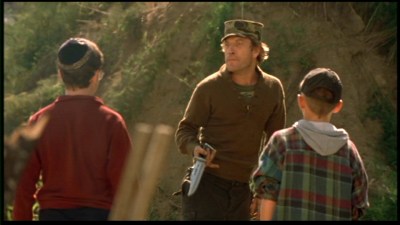 Tzu was famous for his observation that the best warrior uses deception to achieve his goals. Is Butch really back to his old ways or does he have a plan to redeem himself to his family?
Tzu was famous for his observation that the best warrior uses deception to achieve his goals. Is Butch really back to his old ways or does he have a plan to redeem himself to his family?
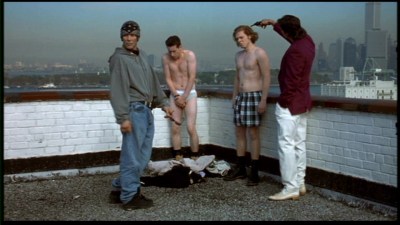 He meets his brother and his best pal Lester, a proto-metrosexual, at the prison gate, gives the place the bird and pulls a bag of heroin of his pocket, "courtesy of the state." He and Lester shoot up while Ruby drives them back into the city. Upon arriving, Lester points out two customers of Tank (Tupac Shakur), rich kids from Long Island whom Butch proceeds to humiliate by stealing their clothes and money. When attacked by one of Tank's minions for messing with their customers, Butch responds by sticking a knife in his eye and tells him to warn Tank that he is back in town. We are certainly led to believe that this is one irredeemable hardened thug.
He meets his brother and his best pal Lester, a proto-metrosexual, at the prison gate, gives the place the bird and pulls a bag of heroin of his pocket, "courtesy of the state." He and Lester shoot up while Ruby drives them back into the city. Upon arriving, Lester points out two customers of Tank (Tupac Shakur), rich kids from Long Island whom Butch proceeds to humiliate by stealing their clothes and money. When attacked by one of Tank's minions for messing with their customers, Butch responds by sticking a knife in his eye and tells him to warn Tank that he is back in town. We are certainly led to believe that this is one irredeemable hardened thug.
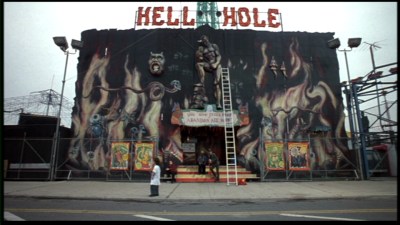 Unfortunately, beyond that, he's just the guy behind the camera. I'm guessing he may have helped Tupac in his acting scenes. Shakur really underplays his character and, as rappers go, was not a bad actor. Still, this was an offbeat choice for Temple -- a stark crime drama set in foreign milieu and he have to give him some props for trying something new.
Unfortunately, beyond that, he's just the guy behind the camera. I'm guessing he may have helped Tupac in his acting scenes. Shakur really underplays his character and, as rappers go, was not a bad actor. Still, this was an offbeat choice for Temple -- a stark crime drama set in foreign milieu and he have to give him some props for trying something new.



